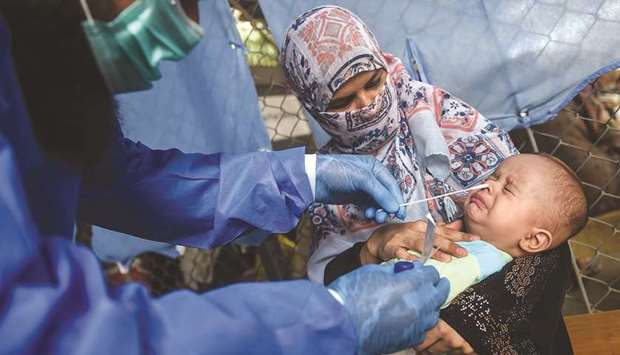Up to 95% of the coronavirus cases in Karachi have been asymptomatic, researchers said yesterday, shedding possible light on why Pakistan has been able to weather the pandemic.
The coronavirus causes the Covid-19 respiratory disease.
Research by the Aga Khan University (AKU) in Pakistan’s largest city found that more than nine out of 10 people who contracted the coronavirus showed no sign of the disease.
Public health experts tested 2,000 people from several neighbourhoods across the sprawling metropolis of about 20mn.
“Ninety-five per cent of those who tested positive for Covid-19 reported feeling no symptoms of the illness such as a cough, fever or sore throat,” Imran Nisar, the study’s lead researcher, told AFP.
Researchers said that more surveys were needed to understand why so many cases appear to be asymptomatic in Karachi, but they suggested that Pakistan’s young population might have been a factor.
The country’s median age is only 22, and the coronavirus is known to disproportionately impact older people with prior health complications.
The AKU research report, prepared in collaboration with US-based international collaborators Dr Bailey Fosdick and Dr Daniel Barremore, noted that “the proportion of asymptomatic cases in Pakistan is much higher than in the developed world”.
“The proportion of asymptomatic cases in Pakistan is much higher than the developed world. Since asymptomatic people do not seek hospital treatment, this may help explain why Pakistan’s hospitals have not been under the same strain as in Spain and the United Kingdom,” the study found, according to a statement.
In addition, the study also suggested that children and adolescents are just as likely to contract the virus as adults, and men and women face the same perils of being infected from the contagious disease.
Confirming a sharp rise in Covid-19 cases between April and June this year, the study says that the results are in line with the federal government’s national seroprevalence study, where antibody testing found that overall 11 per cent of Pakistanis had contracted the disease.
An assistant professor at AKU and co-investigator on the study, Dr Imran Nisar, said: “The sharp increase in antibody levels in an area with low reported cases indicates that the virus continues to spread unchecked in populations where testing rates are sub-optimal.”
More than 2,000 participants participated in the first two phases of the study, where researchers are currently undertaking a third serosurvey and plan to do a fourth in September 2020.
These surveys will also reflect on the overall impact of easing coronavirus lockdowns around Eid al-Adha and during Muharram processions on the coronavirus transmission rate in communities.
“Antibody testing or seroprevalence provides a true picture of the burden of Covid-19 as they capture asymptomatic cases who represent silent carriers of the disease,” said Dr Fyezah Jehan, an associate professor at AKU and co-investigator on the study.
“Understanding how, when, and in what types of settings, Covid-19 spreads is critical to developing effective public health and infection prevention measures to break chains of transmission.”
Pakistan’s low number of cases compared to other South Asian nations has baffled public health experts.
The country has a long history of failing to contain several infectious diseases such as polio, tuberculosis and hepatitis, while successive governments have underfunded its healthcare sector for decades.
The number of cases is falling, intensive care units are seeing few virus patients and Pakistan has lifted most remaining restrictions, with schools and universities due to re-open next week.
To date Pakistan has confirmed about 300,000 infections and is recording a few hundred new cases per day, while the daily death toll continues to hover in the single digits.

This picture taken on September 1 shows a health official taking a swab sample from a child to test for the coronavirus at a testing site in Karachi.
